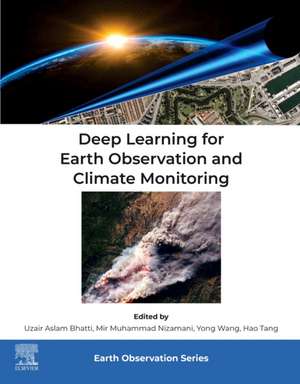Deep Learning for Earth Observation and Climate Monitoring
Editat de Uzair Aslam Bhatti, Mir Muhammad Nizamani, Yong Wang, Hao Tangen Limba Engleză Paperback – mar 2025
This book allows readers to apply learning representations, unsupervised deep learning, and physics-aware models to Earth observation data, enabling them to leverage the power of deep learning to fully utilize the wealth of environmental data from satellite technologies.
- Introduces deep learning for classification, covering recent improvements in image segmentation and encoding priors, anomaly detection and target recognition, and domain adaptability
- Includes both learning representations and unsupervised deep learning, covering deep learning picture fusion, regression, parameter retrieval, forecasting, and interpolation from a practical standpoint
- Provides a number of physics-aware deep learning models, including the code and the parameterization of models on a companion website, as well as links to relevant data repositories, allowing readers to test techniques themselves
Preț: 805.92 lei
Preț vechi: 1053.63 lei
-24% Nou
Puncte Express: 1209
Preț estimativ în valută:
154.23€ • 160.82$ • 128.18£
154.23€ • 160.82$ • 128.18£
Carte nepublicată încă
Doresc să fiu notificat când acest titlu va fi disponibil:
Se trimite...
Preluare comenzi: 021 569.72.76
Specificații
ISBN-13: 9780443247125
ISBN-10: 0443247129
Pagini: 520
Dimensiuni: 152 x 229 mm
Editura: ELSEVIER SCIENCE
ISBN-10: 0443247129
Pagini: 520
Dimensiuni: 152 x 229 mm
Editura: ELSEVIER SCIENCE
Cuprins
1. Introduction: Advancing Ecological Protection Through Integrated GIS-Enabled Environmental Monitoring: A Holistic Approach to Addressing Environmental Pollution
Section I: Deep Learning For Climate Change
2. Secure Data Storage and Processing Architectures for Climate IoT Systems
3. Artificial Intelligence for Remote Sensing and Climate Monitoring
4. Carbon emission pattern analysis and its relationship with climate change
Section II: Deep Learning For Ecological Patterns
5. Application of GIS and remote sensing technology in ecosystem services and biodiversity conservation
6. Unlocking Environmental Secrets with Deep Learning: Pioneering Progress and Uses in India’s Earth Surveillance and Climate Tracking
7. Application of machine learning to urban ecology
Section III: Deep Learning For GIS
8. An integrated deep learning-based approach for traffic maintenance prediction with GIS data
9. Enriching the metadata of map images: a deep learning approach with GIS-based data augmentation
Section IV: Deep Learning For Lulc
10. Enhancing Geospatial Insights: A Data-Driven Approach to Multi-Source Remote Sensing Fusion
11. Climate change air quality monitoring using Sentimental 2 dataset
12. Latest trends in LULC monitoring using Deep Learning
Section V: Deep Learning For Oceans
13. Oceanic Biometric Recognition Algorithm Based on Generalized Zero-Shot Learning
14. Remote Sensing lmage Fusion Based on Deep Learning and Convolutional Neural Network Technique
15. Oil Spills and the Ripple Effect: Exploring Climate and Environmental Impacts Through a Deep Learning Lens
Section I: Deep Learning For Climate Change
2. Secure Data Storage and Processing Architectures for Climate IoT Systems
3. Artificial Intelligence for Remote Sensing and Climate Monitoring
4. Carbon emission pattern analysis and its relationship with climate change
Section II: Deep Learning For Ecological Patterns
5. Application of GIS and remote sensing technology in ecosystem services and biodiversity conservation
6. Unlocking Environmental Secrets with Deep Learning: Pioneering Progress and Uses in India’s Earth Surveillance and Climate Tracking
7. Application of machine learning to urban ecology
Section III: Deep Learning For GIS
8. An integrated deep learning-based approach for traffic maintenance prediction with GIS data
9. Enriching the metadata of map images: a deep learning approach with GIS-based data augmentation
Section IV: Deep Learning For Lulc
10. Enhancing Geospatial Insights: A Data-Driven Approach to Multi-Source Remote Sensing Fusion
11. Climate change air quality monitoring using Sentimental 2 dataset
12. Latest trends in LULC monitoring using Deep Learning
Section V: Deep Learning For Oceans
13. Oceanic Biometric Recognition Algorithm Based on Generalized Zero-Shot Learning
14. Remote Sensing lmage Fusion Based on Deep Learning and Convolutional Neural Network Technique
15. Oil Spills and the Ripple Effect: Exploring Climate and Environmental Impacts Through a Deep Learning Lens
